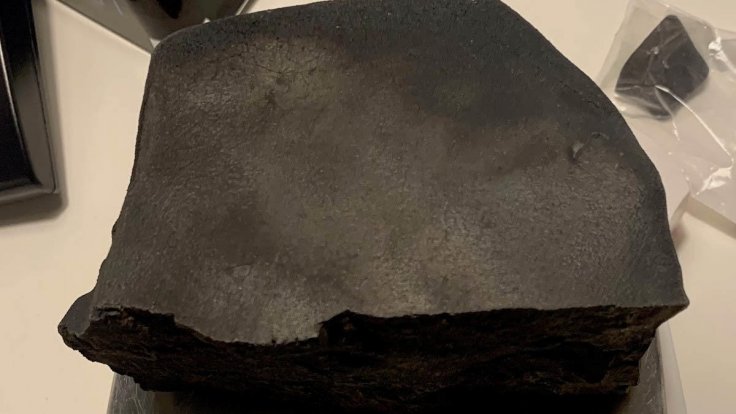
One 'mudball' meteorite looks like a block of mud and many say smells like cooked Brussels sprouts. This recent addition to the Field Museum of Natural History in Chicago is a cosmic meteorite that fell to the earth on April 23, 2019.
Called Aguas Zarcas after the Costa Rican region in Alajuela province, where the meteorite landed last April, it weighs about 4 lbs, or 1.8 kilograms. It has a clear and unique smell that makes it stand apart from other rocky or metallic meteorites, according to Field Museum representatives. The distinctive smell emanates from organic compounds such as amino acids. It is quite possible that billions of years ago, there were strange-smelling meteorites that were seen as the building blocks for life. Scientists will now explore it further to check out what clues it gives to shaping the solar system.
The meteorite was donated to the Field Museum.
Aguas Zarcas blazed across the skies over Costa Rica like a "spectacular fireball", The Meteoritical Society reported. While entering the area, it broke apart. One piece from the meteorite that weighted 1,162 grams crashed into a house, while another piece that was just 280 gms reportedly struck a doghouse.
On earth, there are about 50,000 meteorites, of which 99.8% originate from asteroids. The others are rocks that have come from Mars as well as our own moon by meteor collisions, according to NASA. The three types of meteorites might be made of iron, stone or a mix of both.
The latest mudball meteorite is also called a carbonaceous chondrite. These are part of the 4% of meteorites hurtling towards the earth, according to Philipp Heck, the Robert A. Pritzker Associate Curator of Meteoritics and Polar Studies at the Field Museum. While in most of the parent asteroids, any intense heat could change the asteroid's chemistry and destroy its amino acids, the mudball meteorite is rather unusual. Even though a number of carbonaceous chondrite meteorites contain organic compounds, they might get contaminated by terrestrial amino acids once they crash on the earth, said Heck.
"We smell the organic volatile compounds that leave the meteorite," Heck explained. "Different meteorites have different volatile inventories, mainly because they were 'cooked' to different degrees for different amounts of time on their parent asteroids. That causes them to smell differently."
Interestingly, while geologists might like the smell of a space rock, they refrain from tasting them. "First, because we don't want to contaminate them. Second, because we don't want to expose them to liquid water, which degrades them, particularly the metal and water-soluble minerals and organics. And third, because some meteorites contain harmful materials when eaten," he explained.









